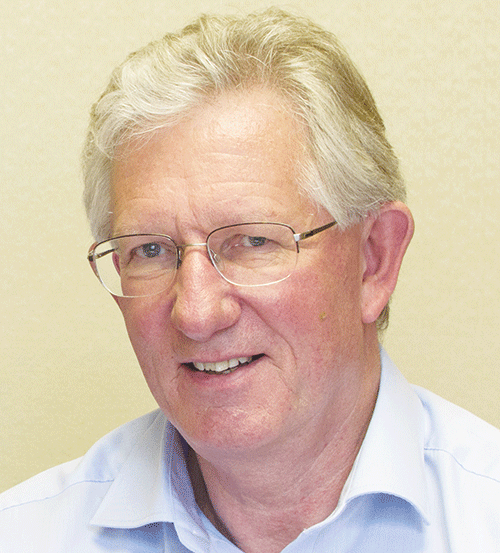 Summiya Yasmeen interviewed Christopher Jolly, the London-based founder of Jolly Learning Pvt. Ltd (estb.1987) which has pioneered Jolly Phonics, a child-centred approach to teaching English through synthetic phonics, and Jolly Grammar. The company sells over 2 million publications each year in over 100 countries. Excerpts:
Summiya Yasmeen interviewed Christopher Jolly, the London-based founder of Jolly Learning Pvt. Ltd (estb.1987) which has pioneered Jolly Phonics, a child-centred approach to teaching English through synthetic phonics, and Jolly Grammar. The company sells over 2 million publications each year in over 100 countries. Excerpts:
What were the reasons which prompted you to promote Jolly Learning?
Stagnation and low standards in the teaching of reading prompted me to start Jolly Learning, way back in 1987. While progress was being made in so many other walks of life, reading standards had not risen and indeed, had fallen. Meanwhile, some 20 percent of children and adults were failing to learn to read. I saw this as an opportunity for change and innovation.
What are the major products and services offered by the company?
Our major products and services are the Jolly Phonics (JP) and Jolly Grammar publications for teaching English to primary age children. We also have a smaller programme called Jolly Music which enables early understanding of music.
How is the JP pedagogy different from others?
Existing pedagogies are based on children merely memorising words. They are not given a skill which they can apply in each new situation. In practical terms, they aren’t able to read a word they haven’t seen before. By contrast with Jolly Phonics, they are taught the ‘code’ of reading. They start by learning the sounds of the language and how they are represented. They are taught to identify the sounds made by letters on the page, and then to blend those sounds to read the spoken word. This means they have the world of words and reading open to them, enabling them to readily read new stories.
How satisfied are you with the growth, development and progress of Jolly Learning over the past three decades?
By some yardsticks, the progress over the past 30 years has been stunning. Jolly Phonics doubles the speed at which children learn to read, and it is thoroughly enjoyed. This has given us a powerful base for developing usage. The Jolly Phonics way of learning English has been adopted by governments around the world — Trinidad, Nigeria, Oman and Fiji. Moreover, in cities worldwide from Accra and Cairo to Mumbai and Kuala Lumpur, children in private schools are learning to read the Jolly Phonics way. In the UK a decade ago, 68 percent of primary schools were using Jolly Phonics before the government finally relented and abandoned its previous policy of whole word learning, and embraced the phonics pedagogy. Now governments around the world include phonics and grammar in their primary school curriculums.
Schools which teach reading and grammar the JP way, achieve excellent results. However, the results still have a modest impact on a national scale. On a global scale, far too many children still fail to learn to read.
I believe the irregularity of English spelling is the elephant in the room which is being ignored, and is an impediment to higher literacy worldwide. The evidence that irrational and idiosyncratic spelling of a large number of English language words lowers achievement, is compelling.
In India, an overwhelming majority of schools follow rote learning pedagogies. What are your plans for popularising the Jolly Phonics programme in India?
Undoubtedly, rote learning is less effective and less engaging. Children have to memorise instead of learning skills and principles that can be applied widely. In India, this comes from force of habit, and the lack of alternatives. To drive change, we have an amazing team of Jolly Phonics trainers in India. They are independent, but with extensive experience of teaching and training. They have been remarkably effective in inspiring other teachers.
Teacher training is crucial to the successful implementation of your phonics, grammar and music programmes. What teacher training programmes do you offer in India and how satisfied are you with their progress?
Teacher training is indeed important, and we are pulling out all stops to train teachers across India to teach the Jolly Phonics way. Our trainers are very active and travel widely across the country. I have personally trained teachers in five cities in India recently. Separately, we offer an extensive and chargeable online teacher training programme and also provide Jolly Phonics lessons, and a free app, which is excellent for lesson preparation.
What are the future growth and development plans of Jolly Learning?
As they say in the military, planning is essential, but the plans are often swept away by events. Nonetheless, we plan to have a wider outreach and specifically to government schools. To them, we offer a pilot with free resources including master trainer costs, and follow that up with free provision of teaching material for a year. Currently, we have many pilots in India, with most close to agreement, while the Nilgiri Hills district in Tamil Nadu has already adopted Jolly Phonics for all government schools.
On a broader canvas, our objective is to reach out to all government schools in emerging countries and to play a part in helping all of them to learn English.























